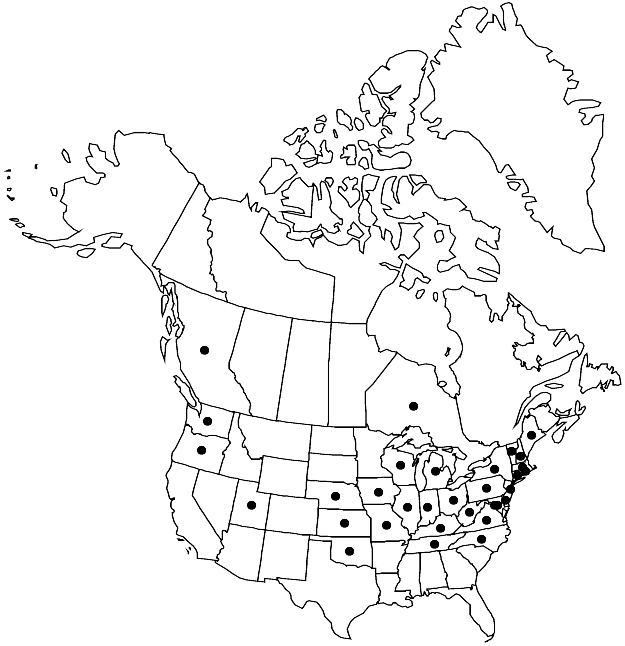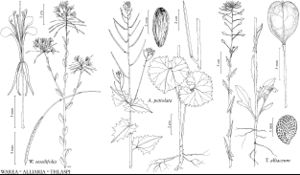Difference between revisions of "Alliaria petiolata"
Bull. Orto Bot. Regia Univ. Napoli 3: 418. 1913.
FNA>Volume Importer |
FNA>Volume Importer |
||
| Line 10: | Line 10: | ||
|name=Arabis petiolata | |name=Arabis petiolata | ||
|authority=M. Bieberstein | |authority=M. Bieberstein | ||
| + | |rank=species | ||
|publication_title=Fl. Taur.-Cauc. | |publication_title=Fl. Taur.-Cauc. | ||
|publication_place=2: 126. 1808 | |publication_place=2: 126. 1808 | ||
| Line 16: | Line 17: | ||
|name=Alliaria officinalis | |name=Alliaria officinalis | ||
|authority=Andrzejowski ex M. Bieberstein | |authority=Andrzejowski ex M. Bieberstein | ||
| + | |rank=species | ||
}} {{Treatment/ID/Synonym | }} {{Treatment/ID/Synonym | ||
|name=Erysimum alliaria | |name=Erysimum alliaria | ||
|authority=Linnaeus | |authority=Linnaeus | ||
| + | |rank=species | ||
}} | }} | ||
|hierarchy=Brassicaceae;Brassicaceae tribe Thlaspideae;Alliaria;Alliaria petiolata | |hierarchy=Brassicaceae;Brassicaceae tribe Thlaspideae;Alliaria;Alliaria petiolata | ||
| Line 42: | Line 45: | ||
-->{{#Taxon: | -->{{#Taxon: | ||
name=Alliaria petiolata | name=Alliaria petiolata | ||
| − | |||
|authority=(M. Bieberstein) Cavara & Grande | |authority=(M. Bieberstein) Cavara & Grande | ||
|rank=species | |rank=species | ||
| Line 58: | Line 60: | ||
|publication year=1913 | |publication year=1913 | ||
|special status= | |special status= | ||
| − | |source xml=https://jpend@bitbucket.org/aafc-mbb/fna-data-curation.git/src/ | + | |source xml=https://jpend@bitbucket.org/aafc-mbb/fna-data-curation.git/src/f50eec43f223ca0e34566be0b046453a0960e173/coarse_grained_fna_xml/V7/V7_1311.xml |
|tribe=Brassicaceae tribe Thlaspideae | |tribe=Brassicaceae tribe Thlaspideae | ||
|genus=Alliaria | |genus=Alliaria | ||
Revision as of 22:13, 16 December 2019
Stems simple or branched distally, (1.5–)3–9(–13) dm; glabrous or pilose basally, trichomes to 1.5 mm. Basal leaves: petiole 3–16(–22) cm; blade reniform or cordate, (6–)15–88(–118) mm wide (shorter in length), surfaces glabrous or pilose. Cauline leaves: petiole shorter than basal; blade ovate, cordate, or deltate, to 15 × 15 cm, base cordate or truncate, margins acutely to obtusely toothed, apex acute. Racemes several-flowered. Fruiting pedicels terete, (2–)3–10(–15) mm. Flowers: sepals (2–)2.5–3.5(–4.5) × 0.7–1.5 mm; petals (2.5–)4–8(–9) × (1.5–)2–3(–3.5) mm, base attenuate to clawlike; filaments 2–3.5(–4.5) mm; anthers oblong, 0.7–1 mm. Fruits divaricate-ascending, subtorulose, quadrangular or subterete, (2–)3–7(–8) cm × 1.2–2.5 mm; style (0.2–)1–2(–3) mm. Seeds dark brown or black, narrowly oblong, 2–4.5 × 0.7–2 mm. 2n = 42.
Phenology: Flowering Apr–May.
Habitat: Roadsides, trails, railroad tracks, stream banks, waste places, fields, shaded woodlands, bluffs, thickets, steep slopes, disturbed fields, floodplains, woods, shaded forest floor
Elevation: 0-1200 m
Distribution

B.C., Ont., Conn., Del., D.C., Ill., Ind., Iowa, Kans., Ky., Maine, Md., Mass., Mich., Mo., Nebr., N.H., N.J., N.Y., N.C., Ohio, Okla., Oreg., Pa., R.I., Tenn., Utah, Vt., Va., Wash., W.Va., Wis., South America (Argentina), Eurasia, n Africa.
Discussion
Selected References
None.
